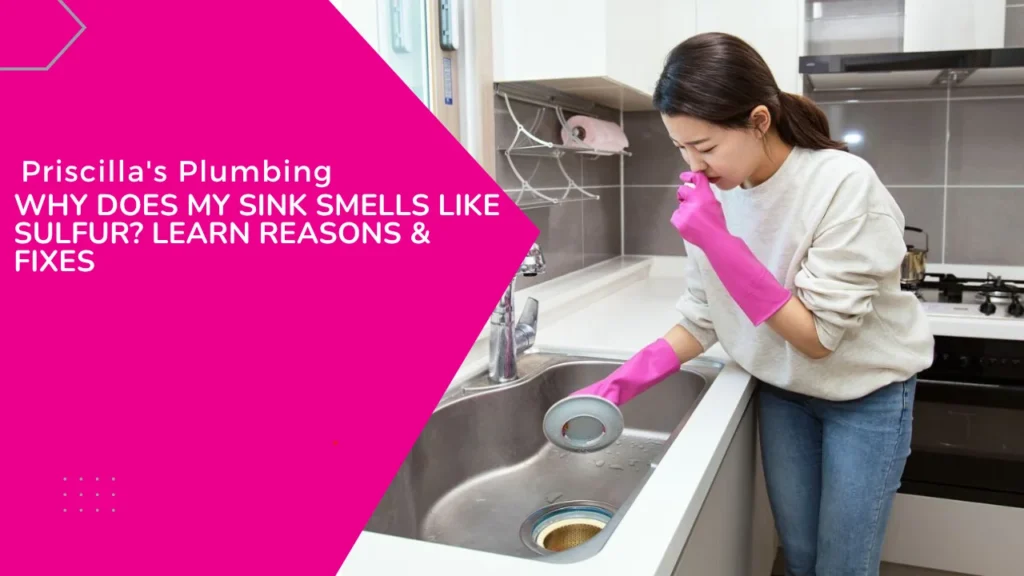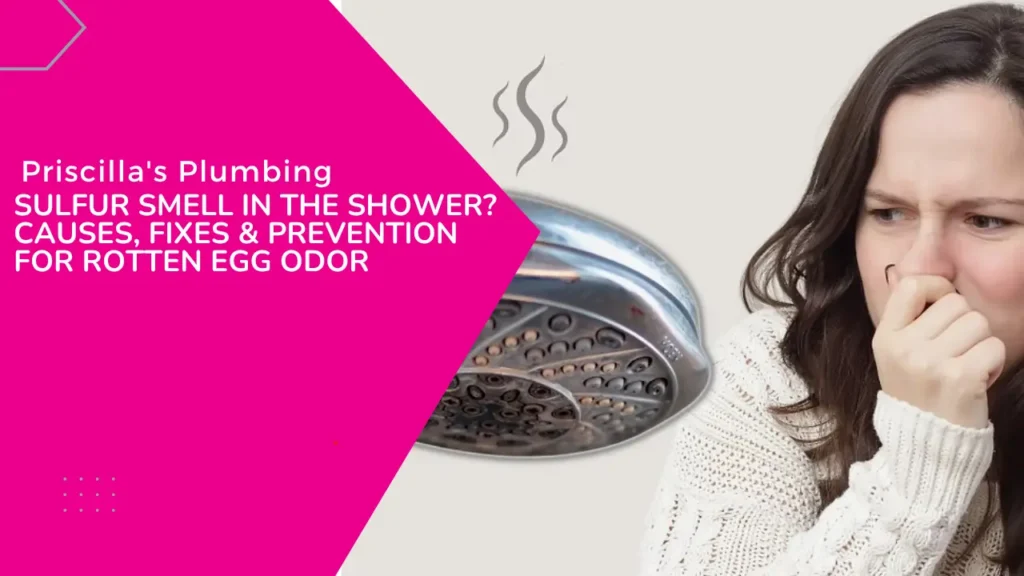Have you ever turned on the tap and noticed a strong rotten-egg smell coming from your sink? When a sink smells like sulfur, the odor is usually caused by hydrogen sulfide gas, a byproduct of bacteria in drains or minerals reacting in your water supply. While the smell alone isn’t always harmful, it can signal plumbing issues that need attention before they become serious. The tricky part is knowing where the smell is coming from. Is it your drain releasing sewer gases, or is the water itself carrying the odor? The answer changes how you fix it.
In this blog, we will show you how to quickly find the source of why sinks smell like rotten eggs, explain common causes, and outline when to call a plumber.
How Do You Tell If the Sulfur Smell Is From My Sink or Water?
When a sink smells like sulfur, the first step is to determine whether the odor originates from the drain system or your water supply. The easiest way to do this is with the “glass test,” a quick method most plumbers recommend:
- Fill a glass of water directly from the smelly faucet.
- Step away from the sink before smelling the water.
- No odor in the glass: The problem is inside the drain. Bacteria, biofilm, or a dry P-trap may be releasing sewer gases into the room.
- Smell only in hot water: This points to the water heater. The magnesium anode rod may be reacting with sulfates, creating hydrogen sulfide gas and a sulfur smell in the bathroom sink or kitchen sink.
- Smell in both hot and cold water: The issue lies in the water supply itself. This is common with wells where sulfur-reducing bacteria grow, but it can also affect municipal water drawn from groundwater.
To double-check, repeat the test at another sink. If every faucet produces the same odor, the water supply is almost certainly the cause.
Why it matters: According to the EPA and USGS, hydrogen sulfide is a naturally occurring gas that gives off the rotten-egg smell. In small amounts, it’s usually not harmful; however, persistent odors may indicate plumbing issues that require professional attention.
Sometimes the odor is not isolated to one fixture — it may be coming from elsewhere in your home. Learn more about how a rotten-egg smell spreads through the house.
Common Causes of Sulfur Smells in Sinks

Drain-Related Odors
-
Bacteria and biofilms build up in the drain or overflow channel.
-
Dry P-traps fail to block sewer gases.
-
Garbage disposals trap food debris creating foul smells.
Water Heater Issues
-
Magnesium anode rods react with sulfate minerals, causing hydrogen sulfide gas in hot water.
-
Sediment buildup encourages bacteria growth in water heaters.
Water Supply Problems
-
Well water often contains sulfur-reducing bacteria naturally producing the smell.
-
Municipal water from groundwater sources may carry sulfur odors.
Pro Tip: For odors lingering in your toilet, shower, or sink in a specific bathroom, our bathroom-smell troubleshooting post is a helpful resource.
How Do You Fix a Sink That Smells Like Sulfur?
A sink that smells like sulfur is often caused by bacterial growth, decaying buildup, or poor air circulation in your plumbing system. The quickest way to eliminate the odor is by targeting hidden problem spots inside the sink, disposal, and vents, rather than just flushing the drain.
Before you call a plumber, here are quick fixes you can try at home:
1. Clean the Overflow Channel
A common reason a sulfur smell in the bathroom sink lingers is the presence of a hidden overflow channel. Soap scum and bacteria accumulate here, and since most homeowners overlook this area, odors can build up over time. Regular cleaning restores airflow and stops gases from escaping.
- Use a narrow bottle brush dipped in hot, soapy water.
- Flush with hydrogen peroxide to kill bacteria.
- Repeat every few months to prevent odors.
2. Remove Disposal Splash Guard Buildup
If your kitchen sink smells like sulfur, the likely culprit is the rubber splash guard. This spot traps grease, food particles, and biofilm that standard drain cleaners can’t reach. Deep-cleaning is one of the easiest ways to eliminate hidden odors.
- Pull the guard out and scrub with dish soap.
- Soak in a vinegar solution for 10 minutes.
- Replace if cracks or heavy buildup remain.
3. Check the Faucet Aerator
The aerator at the faucet tip can trap minerals and bacteria, releasing odor when water flows. Cleaning this small part restores water freshness and eliminates hidden sulfur smells.
- Unscrew the aerator and rinse under warm water.
- Soak in white vinegar for 30 minutes.
- Brush with an old toothbrush before reinstalling.
4. Inspect Venting and Airflow
When sinks gurgle or smell after draining, the vent system may not be circulating air properly. Poor venting creates negative pressure, forcing gases back into the sink.
- Look for slow drains or gurgling sounds.
- Check if nearby vents are blocked by debris.
- Call a plumber for a smoke or camera inspection.
Pro tip: Fixing a sink drain that smells bad often requires a combination of cleaning hidden components and checking airflow, not just flushing the pipe. If these steps don’t work, it’s a sign of a deeper plumbing issue best handled by a professional.
Why Does Your Sink Smell Like Sulfur Only With Hot Water?
If your sink smells like sulfur only when using hot water, the odor typically originates from a chemical reaction within your water heater. The magnesium anode rod often reacts with sulfate minerals or bacteria, producing hydrogen sulfide gas and the rotten egg smell.
Cold water that doesn’t smell confirms it’s a water heater issue, not a problem with your drain or supply line.
1. The Anode Rod Reaction
Inside your water heater is a sacrificial anode rod designed to prevent corrosion. When this rod, usually made of magnesium, reacts with sulfates or sulfur-reducing bacteria, it releases hydrogen sulfide gas. That gas dissolves in hot water and escapes when the faucet is turned on, explaining why the sink smells like rotten eggs only when hot water is used.
- Happens only with hot water, never cold.
- More noticeable after the tank sits unused.
- Stronger in homes with well water rich in minerals.
2. Common Hot-Water Issues That Trigger Sulfur Smells
Beyond the anode rod reaction, sulfur odors in hot water often originate from conditions that allow bacteria to thrive or gases to accumulate. Long periods of stagnation, mineral-heavy well water, or sediment inside the tank can all worsen hydrogen sulfide formation, making the rotten egg smell much stronger.
- Sediment buildup: Organic material at the tank’s base feeds odor-causing bacteria.
- Low-use heaters: Stagnant water allows sulfur-reducing bacteria to multiply.
- Mineral-rich wells: Higher sulfate levels increase the chance of hydrogen sulfide gas.
How to Safely Fix Sulfur Smell in Hot Water
If your hot water gives off a rotten egg smell, there are safe solutions that target the source of the issue inside the water heater. These methods either stop the chemical reaction or remove the bacteria that cause hydrogen sulfide gas, but some steps should only be performed by professionals.
- Replace the anode rod: Swap the magnesium rod for an aluminum-zinc alloy or a powered anode to stop the reaction that causes your sink to smell like rotten eggs.
- Flush the tank: Drain and disinfect the heater to clear bacteria and sediment buildup.
- Shock chlorinate wells: Well users can disinfect the water supply and heater to kill sulfur-reducing bacteria.
Safety note: Water heaters are pressurized systems. For safe repairs or disinfection, always hire a licensed plumber.
When to Test Your Water?
Even after fixing your water heater, some odors may return if the problem originates from your supply. If you rely on a residential water supply, it’s a good idea to test your water annually for bacteria and hydrogen sulfide. This helps catch the causes behind a recurring sulfur smell in the bathroom sink or kitchen sink that smells like sulfur before it worsens.
According to Virginia Tech’s Household Water Quality Program, routine well testing can detect seasonal changes or bacterial growth in your water supply, helping you address problems at their source rather than just treating the symptoms.
How to Prevent Sulfur Smells From Coming Back?
Once you have removed the sulfur odor, keeping it from returning is just as important. Simple maintenance habits prevent bacteria, gases, and buildup from causing the rotten egg smell to recur. Most steps take only a few minutes and can save you costly plumbing visits in the future.
- Run water weekly: Keep P-traps in unused sinks filled to prevent sewer gases from entering.
- Scrub splash guards monthly: Clean garbage disposal guards where food particles and bacteria tend to accumulate.
- Flush overflow channels quarterly: Brush and sanitize bathroom sink overflows.
- Service your heater annually: Schedule a water heater flush and inspection.
- Test well water yearly: Monitor for hydrogen sulfide and bacteria in private wells.
Following these small routines helps prevent recurring sulfur odor in sinks and drains, keeping your home fresh and safe.
When to Call a Plumber for Sulfur Smells?
DIY fixes can address minor odors, but some sulfur smells indicate more serious plumbing issues. If the odor spreads beyond one sink, keeps coming back, or is linked to drainage problems, it’s time to bring in a professional before small issues turn into costly repairs.
- Whole-house odor: Smell is present in multiple sinks or rooms.
- Drainage warning signs: Gurgling drains, bubbling toilets, or frequent clogs.
- Short-lived fixes: Odor returns within one to two days of cleaning.
- Persistent hot-water smell: Even after flushing the water heater.
- Structural risks: Possible blocked vent, sewer line issue, or main connection leak.
If you notice any of these warning signs, it’s best to call a licensed plumber immediately. In the next section, we’ll explain why homeowners in Pompano Beach trust Priscilla’s Plumbing to solve issues of sulfur smells in your sink quickly and safely.
Why Choose Priscilla’s Plumbing to Eliminate Sulfur Smells?
If you’ve already tried the common fixes and the sink smells like sulfur even after cleaning, that’s where we step in. Sulfur odors often indicate issues lurking deep within your plumbing system, such as blocked vents, failing seals, or sewer line leaks that DIY methods may not be able to reach.
At Priscilla’s Plumbing, we specialize in identifying and fixing these hidden causes quickly and safely. Our team combines advanced tools, such as camera inspections, with decades of hands-on experience in Pompano Beach plumbing systems. We don’t just mask the smell, we eliminate it at the source.
- Local Expertise: We know the unique challenges of South Florida’s humid climate and aging sewer systems.
- Advanced Diagnostics: From vent blockages to mainline leaks, we pinpoint the exact cause.
- Lasting Solutions: Our repairs prevent sulfur odors from returning.
Don’t let a rotten egg smell put your family’s health or comfort at risk. Hire an expert from Priscilla’s Plumbing today or call us at (954)-787-2052 to schedule a professional inspection and get lasting relief from sulfur odors in your home.
Conclusion
A sink that smells like sulfur isn’t just a nuisance; it’s a sign that something in your plumbing or water system needs attention. Whether it’s bacteria in the drain, a reaction from the water heater, or issues with well water, acting quickly prevents bigger problems, such as sewer gas leaks or costly repairs.
By following the simple checks and fixes we’ve outlined, you can often solve the smell yourself. But if the odor persists or spreads throughout your home, it’s time to call in an expert.
For homeowners in Pompano Beach, Priscilla’s Plumbing is your trusted partner for lasting solutions. Don’t let a rotten egg smell linger. Schedule an inspection today and get peace of mind that your home is safe, fresh, and comfortable.
FAQs
Q1. Why does my sink smell like sulfur but only in the morning?
If your sink smells like sulfur only in the morning, stagnant water in the pipes, or a dry P-trap may be allowing gases to build up overnight. Once water flows, the odor may lessen. Running water regularly and cleaning the trap can usually stop this problem.
Q2. What causes a sink drain to smell bad even after cleaning?
A sink drain smells bad even after cleaning when biofilm lingers in hidden areas, such as the overflow channel, garbage disposal splash guard, or the vent system. Simple drain flushing won’t remove it. A deeper scrub with a brush, vinegar soak, or professional cleaning may be required.
Q3. Does a kitchen sink that smells like sulfur always mean sewer gas?
Not always. A kitchen sink smells like sulfur if food scraps rot in the disposal, bacteria form in the P-trap, or sewer gases leak through vent problems. The smell doesn’t always mean a dangerous gas leak, but it should be checked if multiple drains or the whole house smells.
Q4. Why does my sink smell like rotten eggs when I use hot water?
If your sink smells like rotten eggs only with hot water, the water heater is likely the cause. The magnesium anode rod inside can react with minerals or bacteria, releasing hydrogen sulfide gas. Replacing the rod, flushing the tank, or professional treatment usually resolves the odor.
Q5. Why is there a sulfur odor coming from my sink overflow?
A sulfur odor emanating from the sink overflow occurs when soap scum and bacteria accumulate in the overflow hole. Regular flushing doesn’t reach this hidden channel, so the smell lingers. Scrubbing the overflow with a brush and sanitizing with hydrogen peroxide usually clears the odor.
Q6. How can I prevent the sulfur smell in a bathroom sink from returning?
To prevent a sulfur smell in the bathroom sink, keep the P-trap full by running water weekly, scrub the overflow hole every few months, and clean aerators to remove bacteria. Annual water heater service and testing well water also help keep rotten egg smells from returning.







